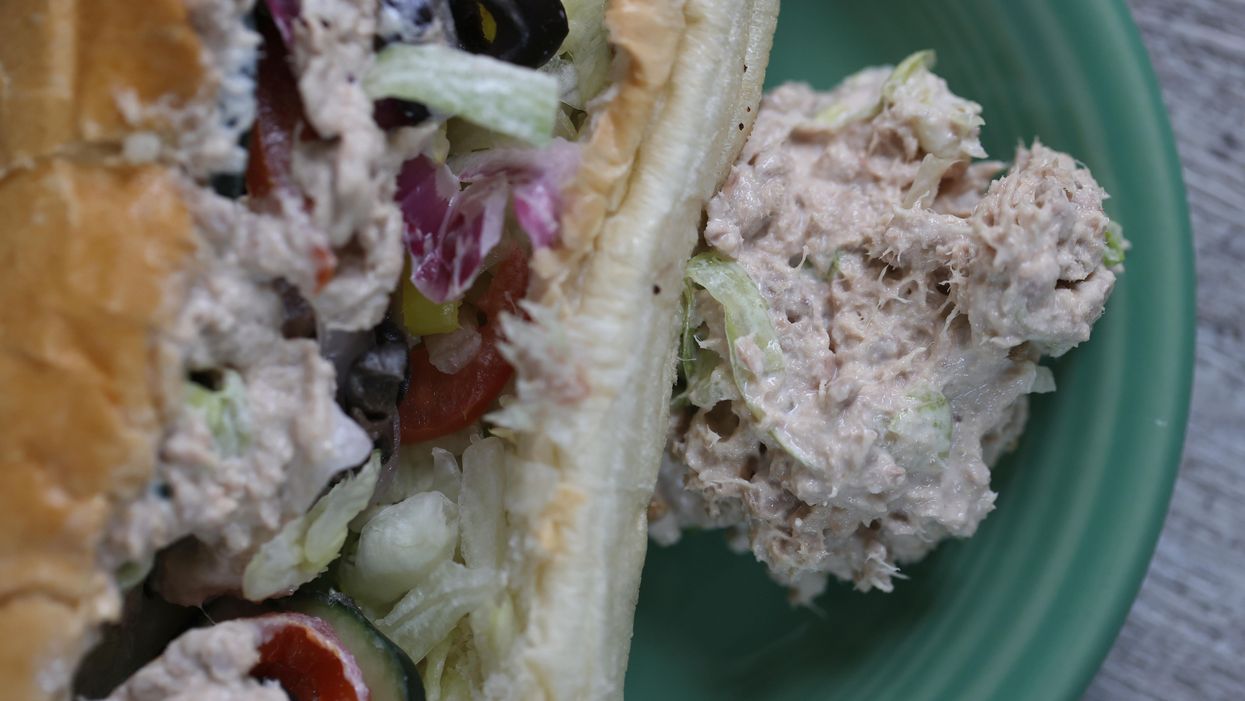
Photo Illustration by Justin Sullivan/Getty Images

Fast-food sandwich chain Subway is currently facing a class-action lawsuit over the contents of the tuna product the company offers its customers.
A weekend New York Times report took a look at what goes into the eatery's tuna offerings — and even had some sandwiches tested by a lab. The Times said the lab found no identifiable tuna DNA in the tuna sandwiches the paper had tested.
For the report, Times reporter Julia Carmel purchased 60 inches of Subway tuna sandwiches from three different franchises across Los Angeles.
Carmel noted that she removed the tuna from the sandwiches, froze it, and then paid $500 for analysis from a third-party commercial food testing lab to conduct a PCR test to determine the composition of the food. The lab, she said, was "already wary about the challenges of identifying a fish that's been cooked at least once, mixed with mayo, frozen and shipped across the country," but agreed to the testing regardless.
The lab — its identity not disclosed — tested the fish over a period of 30 days and determined that "no amplifiable tuna DNA was present in the sample," and thus the lab did not obtain any "amplification products from the DNA."
"Therefore," the lab concluded in its findings, "we cannot identify the species."
A spokesperson for the lab told Carmel that two different conclusions could be possible based on the results.
"One, it's so heavily processed that whatever we could pull out, we couldn't make an identification," the spokesperson said. "Or, we got some and there's just nothing there that's tuna."
Carmel noted that there are major caveats to consider when looking at the results of such testing.
"Once tuna has been cooked, its DNA becomes denatured — meaning that the fish's characteristic properties have likely been destroyed, making it difficult, if not impossible, to identify," she reported.
A January report from the seafood list, which was compiled by the U.S. Food and Drug Administration, defines 15 different species of fish that can be labeled as "tuna."
Carmel in the report also added that the lawsuit's plaintiffs over the last several months have also reportedly "softened their original claims," and instead of claiming that there is no tuna in Subway's tuna offerings, they are now questioning whether the product is skipjack and yellowfin tuna, as the company has previously insisted.
"In a new filing from June, their complaints centered not on whether Subway's tuna was tuna at all, but whether it was '100% sustainably caught skipjack and yellowfin tuna,'" Carmel wrote.
Carmel also cited Peter Horn, director of the Ending Illegal Fishing Project at the Pew Charitable Trusts.
"In the defense of Subway, or quite a lot of these fishmongers, the further you get the fish from the bone, the harder it is to recognize what that fish is," he said of the suit. "Most of us see the fish on the bone, skin intact, and we can recognize what sort of fish that is. You drop the head and the tail off, it becomes more difficult, but you can still probably recognize it. You take the skin off it, you take it off the bone and you cut it into slices then you're only sort of saying, 'Right, what's the color and texture?'"
The company declined to comment on the Times report's findings.
In February, Inside Edition sent samples from three Subway locations in Queens to an independent Florida-based lab, which determined that the submitted specimens were, indeed, tuna.
"Yes, we confirmed that tuna was definitely in all three samples we received," LeeAnn Applewhite, the CEO of Applied Food Technologies told Inside Edition for their reporting.
Following the test, a spokesperson for Subway told the outlet, "The tuna our franchisees serve to their guests every day is 100% real, cooked tuna, and there simply is no truth to the allegations in the complaint filed in California."
In June's amended complaint, the plaintiffs stated that they are now questioning whether the fish is sustainably caught and harvested.
A Subway spokesperson told People that the new filing was evidence that the plaintiffs "abandoned their original claim that Subway's tuna product contains no tuna."
"However, they filed an amended complaint that now alleges our tuna is not 100% tuna and that it is not sustainably caught skipjack and yellowfin tuna," the spokesperson said. "Just like the original claim, the new claims have absolutely no merit. In fact, the amended complaint does not remedy any of the fundamental flaws in the plaintiffs' case and it is disappointing that they have elected to continue to pursue these baseless claims."
Is Subway's Tuna Sandwich Actually Made of Tuna?www.youtube.com
Plaintiffs Karen Dhanowa and Nilima Amin filed the initial lawsuit in California federal court in January, stating that the restaurant was attempting to pass off an undetermined type of fish as yellowfin tuna and skipjack.
A portion of the suit stated that the quick-service restaurant is "selling and continuing to sell some mixture that is deceptively and dishonestly being passed off as in line with their representations to purchasers but are not actually compliant" and that the product in question is "completely bereft of tuna as an ingredient."
The restaurant has categorically denied the allegations, and told the Times that it "delivers 100 percent cooked tuna to its restaurants, which is mixed with mayonnaise and used in freshly made sandwiches, wraps, and salads that are served to and enjoyed by our guests."
"Subway's tuna sandwich ranks among our guests' favorite sandwiches," the spokesperson added. "The taste and quality of our tuna make it one of Subway's most popular products and these baseless accusations threaten to damage our franchises. Given the facts, the lawsuit constitutes a reckless and improper attack on Subway's brand and goodwill."